上海市2023届高考英语定语从句的译法课件(16张ppt0
文档属性
| 名称 | 上海市2023届高考英语定语从句的译法课件(16张ppt0 | 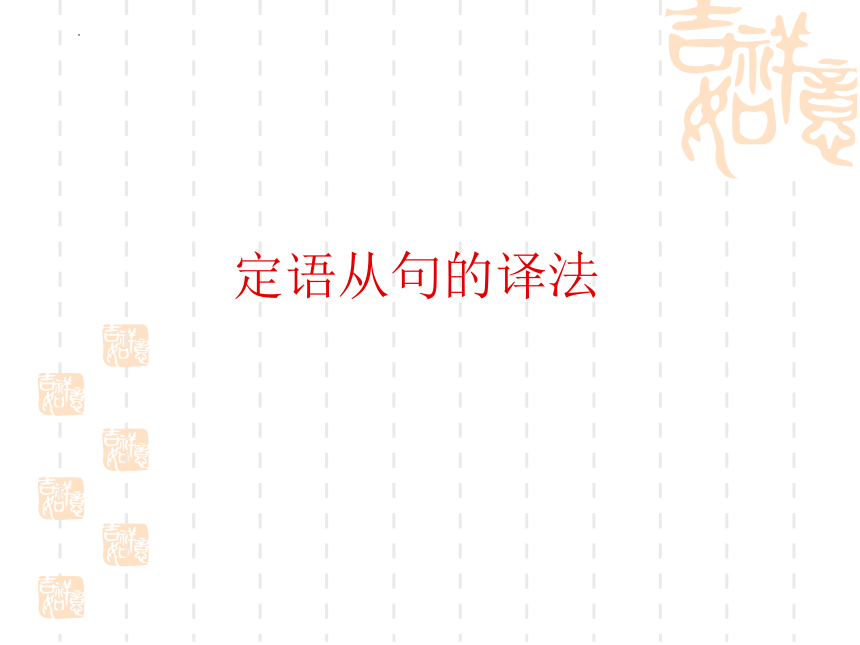 | |
| 格式 | zip | ||
| 文件大小 | 104.3KB | ||
| 资源类型 | 教案 | ||
| 版本资源 | 通用版 | ||
| 科目 | 英语 | ||
| 更新时间 | 2023-01-16 12:46:02 | ||
图片预览

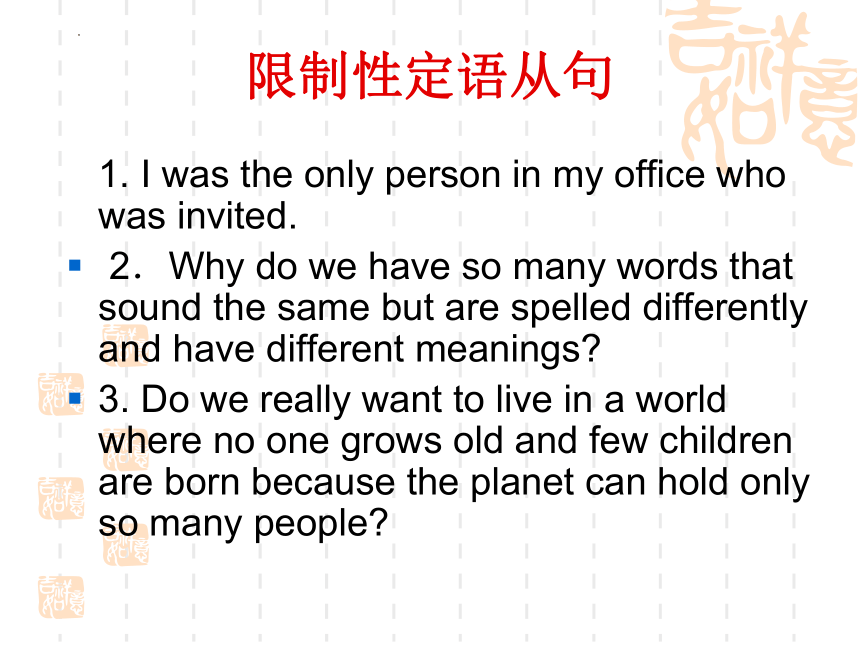
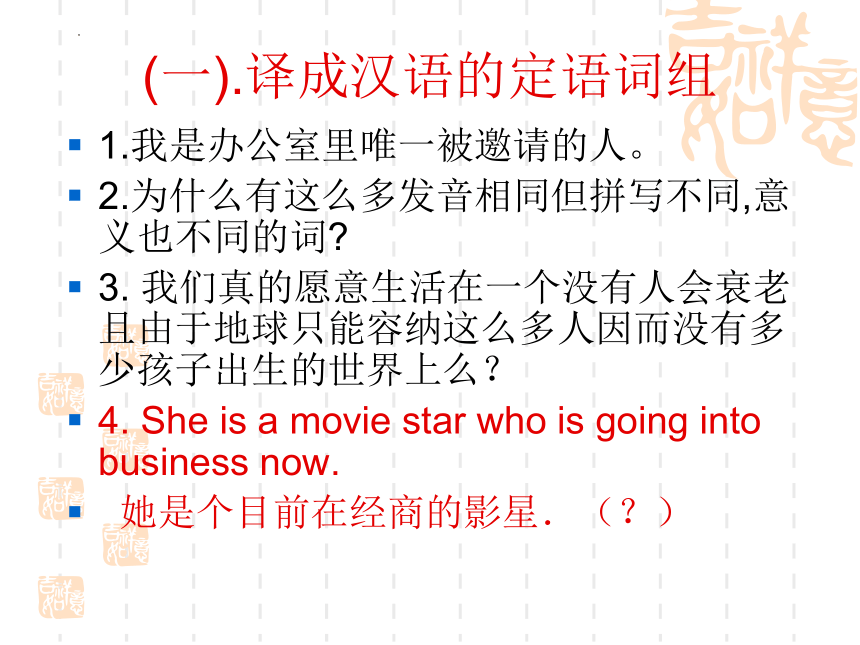
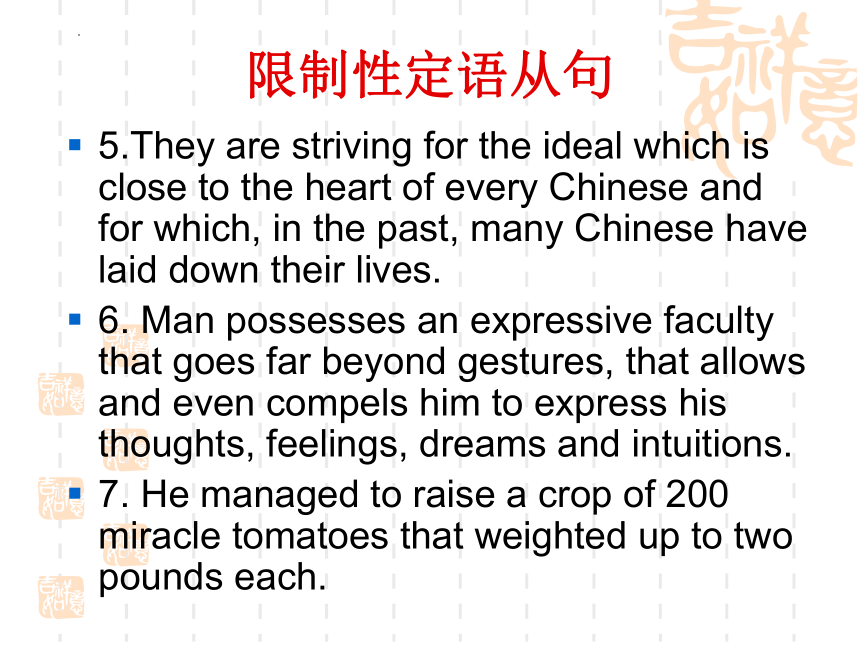
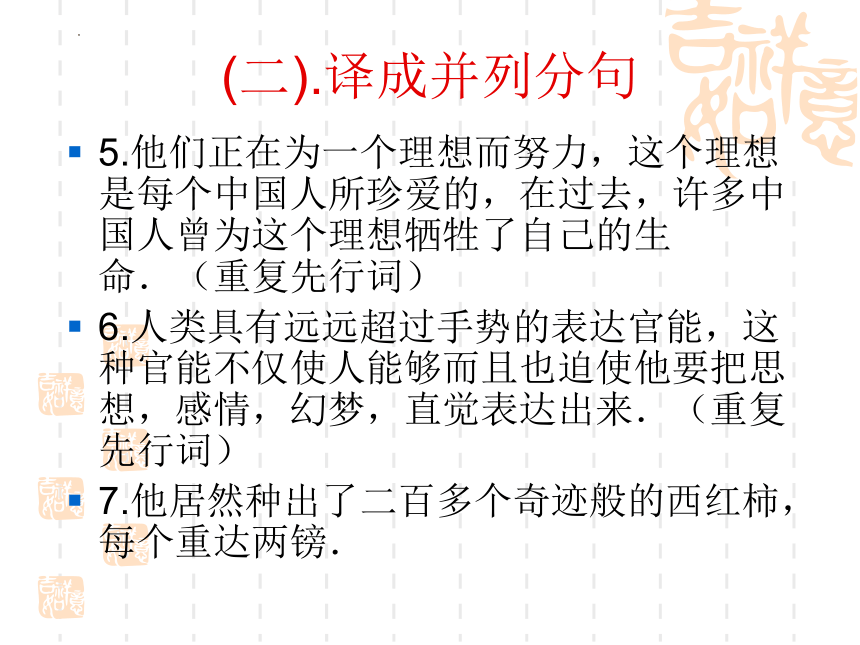
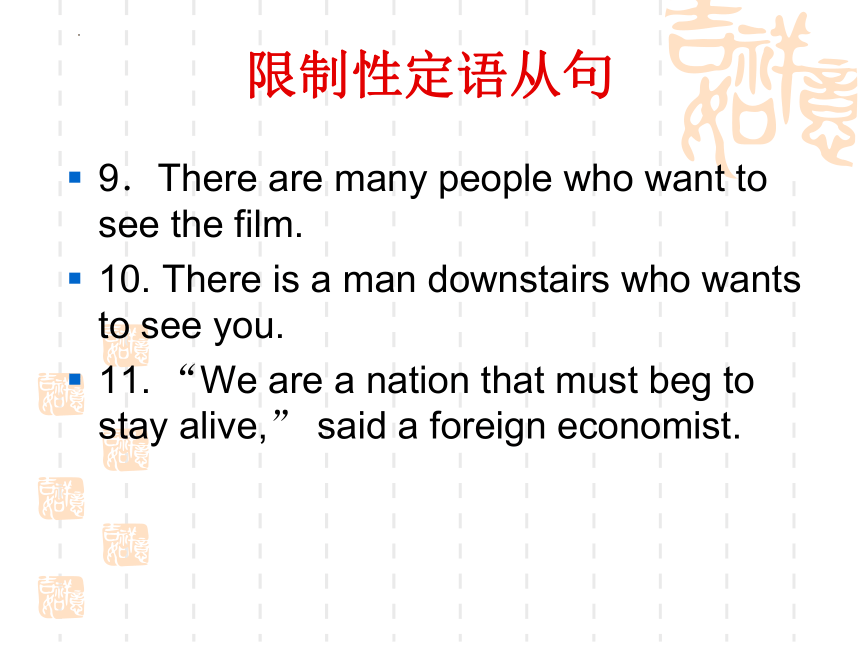
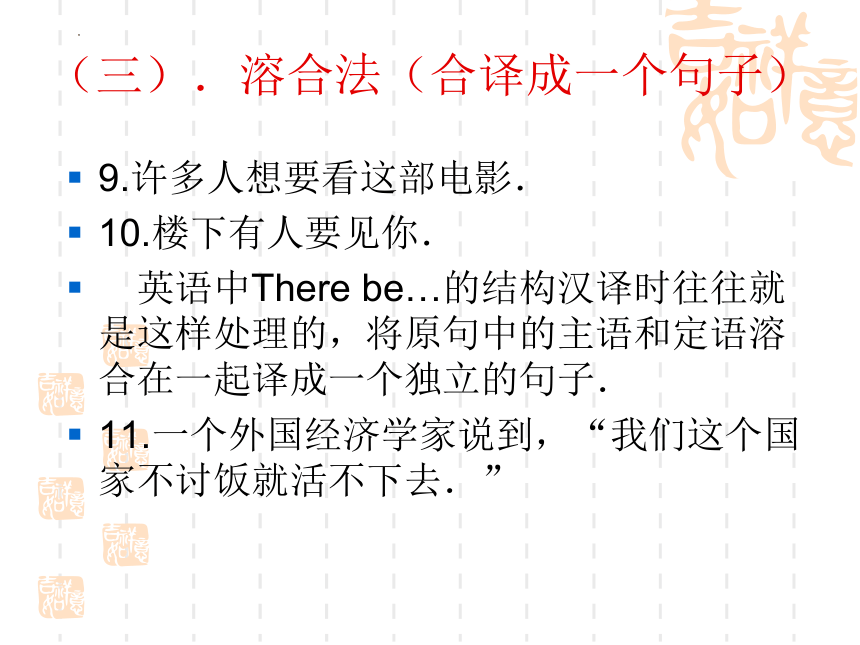
文档简介
(共16张PPT)
定语从句的译法
限制性定语从句
1. I was the only person in my office who was invited.
2.Why do we have so many words that sound the same but are spelled differently and have different meanings
3. Do we really want to live in a world where no one grows old and few children are born because the planet can hold only so many people
(一).译成汉语的定语词组
1.我是办公室里唯一被邀请的人。
2.为什么有这么多发音相同但拼写不同,意义也不同的词
3. 我们真的愿意生活在一个没有人会衰老且由于地球只能容纳这么多人因而没有多少孩子出生的世界上么?
4. She is a movie star who is going into business now.
她是个目前在经商的影星.(?)
限制性定语从句
5.They are striving for the ideal which is close to the heart of every Chinese and for which, in the past, many Chinese have laid down their lives.
6. Man possesses an expressive faculty that goes far beyond gestures, that allows and even compels him to express his thoughts, feelings, dreams and intuitions.
7. He managed to raise a crop of 200 miracle tomatoes that weighted up to two pounds each.
(二).译成并列分句
5.他们正在为一个理想而努力,这个理想是每个中国人所珍爱的,在过去,许多中国人曾为这个理想牺牲了自己的生命.(重复先行词)
6.人类具有远远超过手势的表达官能,这种官能不仅使人能够而且也迫使他要把思想,感情,幻梦,直觉表达出来.(重复先行词)
7.他居然种出了二百多个奇迹般的西红柿,每个重达两镑.
限制性定语从句
9.There are many people who want to see the film.
10. There is a man downstairs who wants to see you.
11. “We are a nation that must beg to stay alive,” said a foreign economist.
(三).溶合法(合译成一个句子)
9.许多人想要看这部电影.
10.楼下有人要见你.
英语中There be…的结构汉译时往往就是这样处理的,将原句中的主语和定语溶合在一起译成一个独立的句子.
11.一个外国经济学家说到,“我们这个国家不讨饭就活不下去.”
非限制性定语从句
1.The emphasis was helped by the speaker’s mouth, which was wide, thin and hard set.
2. But Miggle’s laugh, which was very infectious, broke the silence.
译成前置定语
1.讲话人那又阔又薄又紧绷绷的嘴巴,帮助他加强了语气.
2.但密格尔的富有感染力的笑声打破了静默.
非限制性定语从句
3.The cook turned pale, and asked the housemaid to shut the door, who asked Brittles, who asked the tinker, who pretended not to hear.
4. I was quite surprised to receive a long handwritten response from him, in which he thanked me for taking the time to write and encouraged me to follow my dreams.
5.He had talked to Vice-president Nixon, who assured him that everything that could be done would be done.
译成并列分句
3.厨子的脸色变得苍白,要女仆把门关上,女仆叫布立特尔关,布立特尔关叫补锅匠关,而补锅匠装做没听见.(重复先行词)
4.我意外地收到一封很长的亲笔回信,他在信中感谢我抽时间给他写信,还鼓励我去追求自己的梦想.(重复先行词)
5.他和副总统尼克松谈过话.副总统向他担保,凡是能够做到的都将会竭尽全力去做.(译成独立句)
非限制性定语从句
6.We know that a cat, whose eyes can take in many more rays of light than our eyes, can see clearly in the night.
7. There was something original, independent, and heroic about the plan that pleased all of them.
8. He insisted on building another house, which he had no use for.
9. Men become desperate for work, any work, which will help them to keep alive their families.
译成状语从句
有些定语从句,兼有状语从句的职能,说明原因,结果,目的,让步,假设等关系.翻译这些句子是应发现原文中的逻辑关系,然后译成汉语各种相应的偏正复句.
6.我们知道由于猫的眼睛比我们人的眼睛能吸收更多的光线,所以猫在黑夜也能看得很清楚.(原因)
7.这个方案富于创造性,独出心裁,很有魄力,所以他们都很喜欢.(结果)
8.他坚持要在造一幢房子,竟管他不需要.(让步)
9.人们迫切地要求工作,不管什么工作,只要能维持一家人的生活就行.(条件)
Exercise
1. Those who sacrifice themselves for the people’s cause are the real heroes of history.
2. He’ll show her the place where they could make her look a proper dame– for next to nothing.
3. A fuel is a material which will burn at a reasonable temperature and produce heat.
4. There has never been a man around me who wrote so many memos.
5. Last night I saw a very good film, which was about the French revolution.
Exercise
6. He took the idea to Admiral King, who liked it and ordered a secret study made to see if it could be done.
7. He insisted on buying another coat, which he had no use for.
8. He wishes to write another article that will attract public attention to the matter.
9. Anyone who thinks that rational knowledge need not to be derived from perceptual knowledge is an idealist.
10. Those who are in favour please hold up your hands.
参考译文:
1. 为人民事业牺牲自己的人是历史上真正的英雄.
2.他可以把她带到那个地方去,在那里他们会把她打扮成一个漂亮的少女,而且花不了几个钱.
3.燃料是一种物质,在适当的温度下能够燃烧并释放出热量.
4.在我周围的人中从没有一个象他那样写过那么多的备忘录.
5.昨晚我看了一部关于法国革命的精彩电影.
6.他把这个想法向金海军上将汇报,金将军对这个想法很感兴趣,命令进行秘密研究,看看是否可行.
7.他坚持要再买一件上衣,虽然他并不用得着.
8.他想写一篇文章,以便能引起公众对这件事的注意.
9.如果认为理性认识可以不从感性认识中来,他就是一个唯心论者.
10.如果赞成,就请举手.
定语从句的译法
限制性定语从句
1. I was the only person in my office who was invited.
2.Why do we have so many words that sound the same but are spelled differently and have different meanings
3. Do we really want to live in a world where no one grows old and few children are born because the planet can hold only so many people
(一).译成汉语的定语词组
1.我是办公室里唯一被邀请的人。
2.为什么有这么多发音相同但拼写不同,意义也不同的词
3. 我们真的愿意生活在一个没有人会衰老且由于地球只能容纳这么多人因而没有多少孩子出生的世界上么?
4. She is a movie star who is going into business now.
她是个目前在经商的影星.(?)
限制性定语从句
5.They are striving for the ideal which is close to the heart of every Chinese and for which, in the past, many Chinese have laid down their lives.
6. Man possesses an expressive faculty that goes far beyond gestures, that allows and even compels him to express his thoughts, feelings, dreams and intuitions.
7. He managed to raise a crop of 200 miracle tomatoes that weighted up to two pounds each.
(二).译成并列分句
5.他们正在为一个理想而努力,这个理想是每个中国人所珍爱的,在过去,许多中国人曾为这个理想牺牲了自己的生命.(重复先行词)
6.人类具有远远超过手势的表达官能,这种官能不仅使人能够而且也迫使他要把思想,感情,幻梦,直觉表达出来.(重复先行词)
7.他居然种出了二百多个奇迹般的西红柿,每个重达两镑.
限制性定语从句
9.There are many people who want to see the film.
10. There is a man downstairs who wants to see you.
11. “We are a nation that must beg to stay alive,” said a foreign economist.
(三).溶合法(合译成一个句子)
9.许多人想要看这部电影.
10.楼下有人要见你.
英语中There be…的结构汉译时往往就是这样处理的,将原句中的主语和定语溶合在一起译成一个独立的句子.
11.一个外国经济学家说到,“我们这个国家不讨饭就活不下去.”
非限制性定语从句
1.The emphasis was helped by the speaker’s mouth, which was wide, thin and hard set.
2. But Miggle’s laugh, which was very infectious, broke the silence.
译成前置定语
1.讲话人那又阔又薄又紧绷绷的嘴巴,帮助他加强了语气.
2.但密格尔的富有感染力的笑声打破了静默.
非限制性定语从句
3.The cook turned pale, and asked the housemaid to shut the door, who asked Brittles, who asked the tinker, who pretended not to hear.
4. I was quite surprised to receive a long handwritten response from him, in which he thanked me for taking the time to write and encouraged me to follow my dreams.
5.He had talked to Vice-president Nixon, who assured him that everything that could be done would be done.
译成并列分句
3.厨子的脸色变得苍白,要女仆把门关上,女仆叫布立特尔关,布立特尔关叫补锅匠关,而补锅匠装做没听见.(重复先行词)
4.我意外地收到一封很长的亲笔回信,他在信中感谢我抽时间给他写信,还鼓励我去追求自己的梦想.(重复先行词)
5.他和副总统尼克松谈过话.副总统向他担保,凡是能够做到的都将会竭尽全力去做.(译成独立句)
非限制性定语从句
6.We know that a cat, whose eyes can take in many more rays of light than our eyes, can see clearly in the night.
7. There was something original, independent, and heroic about the plan that pleased all of them.
8. He insisted on building another house, which he had no use for.
9. Men become desperate for work, any work, which will help them to keep alive their families.
译成状语从句
有些定语从句,兼有状语从句的职能,说明原因,结果,目的,让步,假设等关系.翻译这些句子是应发现原文中的逻辑关系,然后译成汉语各种相应的偏正复句.
6.我们知道由于猫的眼睛比我们人的眼睛能吸收更多的光线,所以猫在黑夜也能看得很清楚.(原因)
7.这个方案富于创造性,独出心裁,很有魄力,所以他们都很喜欢.(结果)
8.他坚持要在造一幢房子,竟管他不需要.(让步)
9.人们迫切地要求工作,不管什么工作,只要能维持一家人的生活就行.(条件)
Exercise
1. Those who sacrifice themselves for the people’s cause are the real heroes of history.
2. He’ll show her the place where they could make her look a proper dame– for next to nothing.
3. A fuel is a material which will burn at a reasonable temperature and produce heat.
4. There has never been a man around me who wrote so many memos.
5. Last night I saw a very good film, which was about the French revolution.
Exercise
6. He took the idea to Admiral King, who liked it and ordered a secret study made to see if it could be done.
7. He insisted on buying another coat, which he had no use for.
8. He wishes to write another article that will attract public attention to the matter.
9. Anyone who thinks that rational knowledge need not to be derived from perceptual knowledge is an idealist.
10. Those who are in favour please hold up your hands.
参考译文:
1. 为人民事业牺牲自己的人是历史上真正的英雄.
2.他可以把她带到那个地方去,在那里他们会把她打扮成一个漂亮的少女,而且花不了几个钱.
3.燃料是一种物质,在适当的温度下能够燃烧并释放出热量.
4.在我周围的人中从没有一个象他那样写过那么多的备忘录.
5.昨晚我看了一部关于法国革命的精彩电影.
6.他把这个想法向金海军上将汇报,金将军对这个想法很感兴趣,命令进行秘密研究,看看是否可行.
7.他坚持要再买一件上衣,虽然他并不用得着.
8.他想写一篇文章,以便能引起公众对这件事的注意.
9.如果认为理性认识可以不从感性认识中来,他就是一个唯心论者.
10.如果赞成,就请举手.
